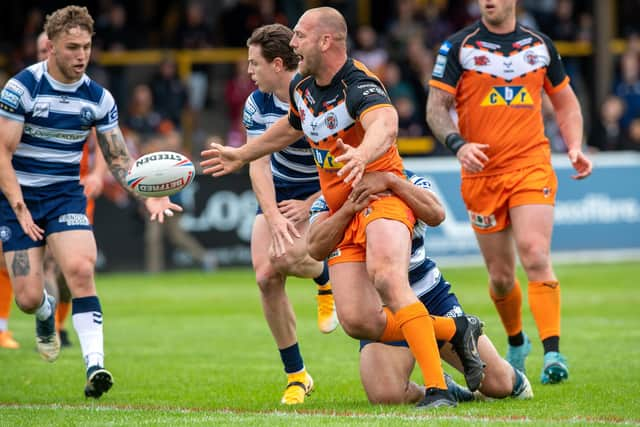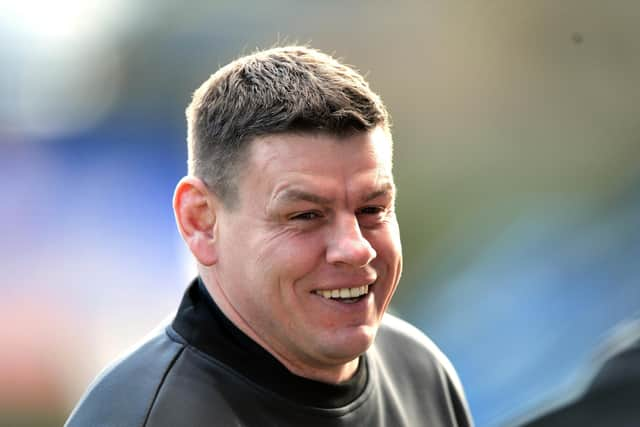Inside Rugby League: Time for common sense over player bans
and live on Freeview channel 276
Last weekend, three of Betfred Super League’s 12 coaches weren’t able to do that.
Leeds Rhinos’ Rohan Smith had 19 players available for the game at Hull KR, Huddersfield Giants selected from 20 for their trip to Salford Red Devils and Catalans Dragons - who travelled to Castleford Tigers - were in a similar situation.
Advertisement
Hide AdAdvertisement
Hide AdThat’s a quarter of the elite competition being reduced to fewer than 21 available players and more under-strength squads have been named this week.


Injuries are part and parcel of rugby league and 23 rounds into the season, nobody is 100 per cent healthy
Virtually every player is carrying some sort of knock or niggle, but the number of more serious injuries keeping players out of action across the competition is alarming.
Tigers, for example, have lost full-back Niall Evalds to season-ending shoulder damage and stand-off Jake Trueman and half-back/full-back Ryan Hampshire won’t play again this year because of anterior cruciate ligament injuries.
Advertisement
Hide AdAdvertisement
Hide AdFor a number of weeks Wakefield Trinity have been playing without the first five names in their squad list; Hull KR have at least a dozen players on their casualty roll and Hull have also been decimated.


To make things worse, those clubs - and others - have key players who are fit, but not allowed to play because of suspension.
Following last weekend, the match review panel - which looks at every tackle in every game - issued 13 charges, to players from nine different clubs.
Toulouse Olympique’s Corey Norman was charged with ‘inappropriate contact’, at the most serious Grade F and banned for eight matches by a disciplinary tribunal on Tuesday.
Advertisement
Hide AdAdvertisement
Hide AdOf this week’s other charges, five were grade A, five B and grade C.


The punishment tariff for grade A is zero to one match; B is one to two and C two to three, so not the most serious offences.
All five players charged with grade A were banned for one game, because of prior misconduct in the previous 12 months. A clear record would have meant no suspension.
The match review panel - and the disciplinary tribunals who deal with more serious cases - have an extremely difficult job, but if you ask someone to look for something, they’ll find it.
Advertisement
Hide AdAdvertisement
Hide AdThe sport is nowhere near as brutal as it was a few decades ago - before every match was filmed, making it impossible for outright thuggery to avoid scrutiny - but rugby league is still a seriously tough sport to play, as the current injury toll illustrates.
Faced with possible legal action from past players, the RFL have no option other than to prioritise participants’ safety. That led to a spate of red and yellow cards earlier this year.
Players must do their bit, nobody wants a return to the days when taking out the opposition dangermen was an accepted tactic, but common sense has to be applied and some of the incidents players are missing games over simply aren’t worth a ban.
Leeds Rhinos’ Rhyse Martin didn’t play against Hull KR after being charged with grade A dangerous contact, 51 weeks after his previous offence.
Advertisement
Hide AdAdvertisement
Hide AdIt would be an understatement to describe the incident as innocuous. There was no injury and most people watching the game wouldn’t have noticed anything untoward.
That’s just one example, but suspensions for relatively minor offences are putting added strain on squads already creaking at the seams and clearly don’t act as a deterrent.
In addition, they could achieve the opposite of what’s intended, by forcing coaches to select players who aren’t fit or ready to play at Super League level.
Clubs are facing a schedule of four games in around 16 days to close the regular season and with suspensions and injuries mounting, there’s a fear some coaches will struggle to get 17 players on the field.
Advertisement
Hide AdAdvertisement
Hide AdClearly, misconduct has to be punished and the match review panel’s work is important and necessary.
Nobody’s suggesting foul play should go unpunished. However, as Tigers boss Lee Radford has suggested, fines would be a much better way of dealing with anything other than the most serious charges.
